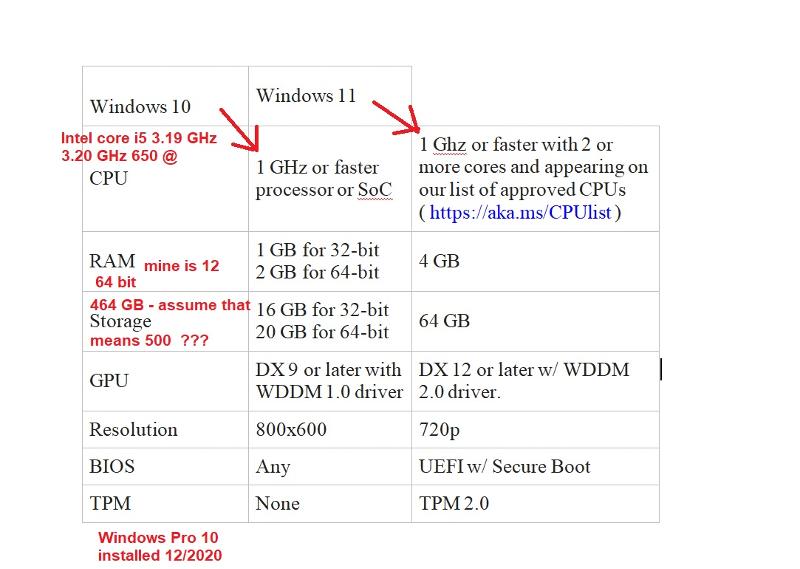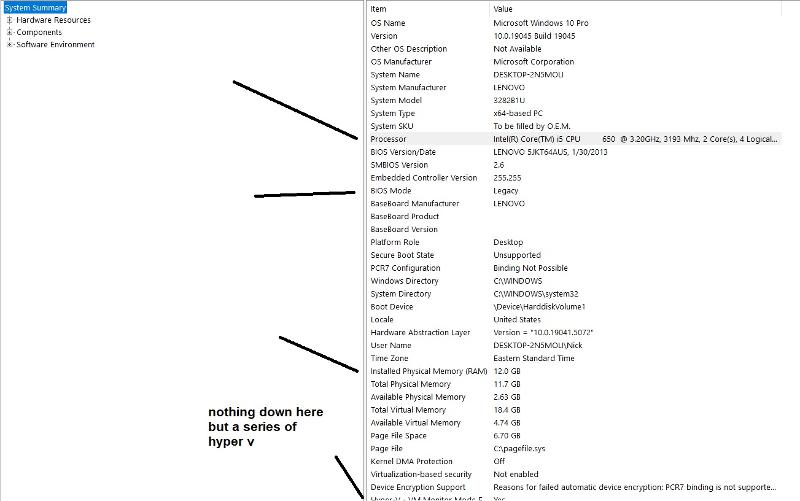Windows OS
--
Questions
--
Followers
Top Experts
List all differences between Windows 10 and Windows 11.
I currently have W10.
------------
One side question…..
From some site the requirements for W11 are:
Processor 1 gig or more with 2 or more cores on compatible 64 bit processor
4 gig memory or more
64 gig storage (hard drive) or more.
What does it mean by 2 or more cores?
Thanks.
Zero AI Policy
We believe in human intelligence. Our moderation policy strictly prohibits the use of LLM content in our Q&A threads.
if you run a system on the low specs, you'll be waiting for days before it's ready….
even w10 with 8 GB is very slow
From the chart above.
** I'd like to confirm one way or the other whether my system can support Windows 11. From the data I added in that chart if "any" of my specs don't seem correct (or are hard to believe) please let me know so I can find the specs on my system.
** Based on this image my system is very able to handle Windows 11. If not please let me know.

start | system information check the processor in system summary and the bios mode. a little bit further down.






EARN REWARDS FOR ASKING, ANSWERING, AND MORE.
Earn free swag for participating on the platform.
If your CPU is an i5-650 then no, it can't run Windows 11. You will not have TPM on that processor. That is a first generation i5 processor from 15 years ago.
It might seem fast enough and have enough cores but it lacks the TPM module.
And with a CPU that old, your motherboard won't have the option for a separate TPM 2.0 module.
As above, no. Your CPU is much too old. It would have to be at least an intel generation 8. Mainboards that could take your CPU didn't yet have tpm 2.x chips, so that would also prevent Windoze 11 from running.
Also, for what it's worth, the TPM requirement is really the source of all the controversy, because so many people have machines that are fast enough but they don't have that module.
As a result, many people started asking whether TPM was necessary (it is essentially a module to aid in certain cryptography scenarios) and they found workarounds to install W11 on processors without TPM.
The official W11 installer is the piece that prevents you from installing W11 without TPM.
It is worth noting that CURRENTLY if you get W11 installed with an old CPU, it will still run.
However, trying to do this is a very bad idea. If Microsoft is that adamant about the TPM requirement, it likely means that it WILL become functionally necessary at some point in the future. So if you upgrade to W11 using a workaround, you might find that some Windows update overnight has broken your PC and you might not be able to get in to recover your data.
In my opinion, it's a bigger risk to upgrade to Windows 11 on an unsupported processor than to stick with W10 for a while longer.

Get a FREE t-shirt when you ask your first question.
We believe in human intelligence. Our moderation policy strictly prohibits the use of LLM content in our Q&A threads.
I don't know what you want to say with “small”, particularly in terms of the CPU. If you are talking of the speed in GHz, then that isn't the relevant value. Today's CPU's are much more efficient, so the GHz values won't compare. They usually also have more built in features, some of which are required by Windoze 11.
The link below lists which CPU's are supported:






EARN REWARDS FOR ASKING, ANSWERING, AND MORE.
Earn free swag for participating on the platform.
better stick with windows 10. it is bloated enough you do not need an even more bloated system with additional senseless requirements and even less respect for your privacy.
note that if you do force your way into installing 11 and some update breals it, you will not be locked away from the data. that could indeed happen with encrypted drives, though.
what will actually happen if you succeed is the machine will probably not crash immediately during the boot process. but it will use most of the ram just for the system. enough to exceed the max swappiness windows tolerates without registry tweaks. the machine will at best be thrown into instant trashing conditions whenever anything runs. it will be painfull slow, crash or become otherwise unresponsive at times, and your hard drive will die very quickly. assuming a 15 years old platter, a few weeks tops. probably less. ssds fom that same period will die even faster.
note that there a many lightweight dists that can run a not too shabby desktop easily. going 32 bits is even a viable option to save on ram even more.my own current 64bits desktop would boot into graphic mode from 2 of 300 megs of ram quite easily. which leaves a rather decent space fof apps. obviousky launching the mozilla suite and some office app at the same time would hit the limit but normal bureautic usage and lighter apps would be totally feasible.
there is no justification beyond the meaningless resource usage. the required specs are much higher than what we used to have for servers in the seven days and there has been imho zero user experience improvement that justifies that kind of spec evolution.
the tpm chip requirement has very debatable rationale and is most likely essentially a commercial operation to incite folks into throwing away perfectly working stuff.
the cpu requirement makes more sense and is mostly about the compilation options used. but there are few reasons not to provide a more generic version for older machines beyond lack of concern for the users and the planet we live on.
It really depends on what you want to do, and whether you're looking for a laptop or a desktop.
As a general rule, the more powerful the graphics card, the more power it eats up, the hotter it gets, and the more expensive it is.
For example, if you want to play very demanding, recent video games with graphic settings turned all the way up, then you typically need a powerful graphics card. So if you are shopping for a laptop, then laptops with powerful graphics cards usually have shorter battery lives (because of the power requirements) and are less portable (graphics cards are heavier/bulkier, making the laptop heavier and bigger).
Meanwhile, on a desktop, portability/battery life is usually not a concern and your main concern will probably be whether you have the right power supply (PSU) to support it.
But if you don't play games and you're simply looking for productivity, then most built-in GPUs on laptops will work just fine and give you an excellent balance of battery life and power and portability. On a desktop, you might not even need a separate GPU (some processors have a built-in GPU).
If I were you, I would approach it this way:
Step 1: Figure out what applications you want to run, and then look up the minimum and recommended graphics cards for those applications.
Step 2: Once you know the general range of cards that will run the programs in a way that works for you, then you look for whatever dependency/support it needs. For example, as I mentioned before, on a desktop you would want to ensure your PSU had enough power for your card.
Step 3: Of the remaining choices that work for you, figure out what's in your budget and then you can buy the card. Don't overdo the spending unless you have a lot of money. Many modern medium-grade cards will do a very good job of running things for a while to come.
For example, I do occasional gaming and I had an NVidia GTX 970 for about 8 years. I completely skipped the GTX 1000 generation, the 2000 generation, the 3000 generation, and when it came time to upgrade my computer, I just went to an NVidia RTX 4070 (4000 generation) and I figure it will probably last me for another 6-8 years. Even when my GTX 970 was struggling on the newest games, I could turn down the graphics a bit and play just fine.
I also have a work laptop that has a weak GPU but is extremely light weight and will last for hours on a battery.
It's all about figuring out the right balance for what you want to do.
The two biggest chip manufacturers for graphics cards are Nvidia and AMD.
Nvidia - slightly more expensive when it comes to dollars-to-performance but it is usually much more power-efficeint (the 4000 series greatly reduced power usage).
AMD - you can get more performance for your dollar but they'll take up more power to run.
There are also other GPU-makers entering the market, like Intel has their own line now. Just ask around to see who has what and what they recommend.

Get a FREE t-shirt when you ask your first question.
We believe in human intelligence. Our moderation policy strictly prohibits the use of LLM content in our Q&A threads.
https://www.schwab.com/trading/thinkorswim/desktop
I called their tech support and they could not give me the minimum requirements to use the program. The rep suggested Windows 10 or 11 minimum and he threw out 16 ram.






EARN REWARDS FOR ASKING, ANSWERING, AND MORE.
Earn free swag for participating on the platform.
Windows OS
--
Questions
--
Followers
Top Experts
This topic area includes legacy versions of Windows prior to Windows 2000: Windows 3/3.1, Windows 95 and Windows 98, plus any other Windows-related versions including Windows Mobile.
